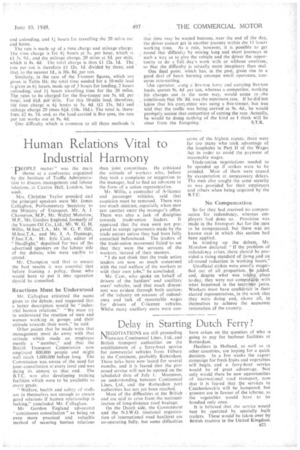Human Relations Vital to Industrial Harmony
Page 25

If you've noticed an error in this article please click here to report it so we can fix it.
PEOPLE matter" was the main theme at a conference organized by the institute of Traffic Administration to discuss management and -labour relations, at Caxton Hall, London, last
week. ,
Mrs. Christine Taylor presided and the _principal speakers .were Mr. James Callaghan, Parliamentary Secretary 'to the -Ministry of Transport, Mr. -A. J. Champion,'M.P., Mr. Walter.Monslow, M.P.:, Mr. Gordon England; formerly:of the y ac u um Oil Co.-, Ltd.; Ildr. W. G. H. Willis, •MInst.T.A.. Mr.. W. G. 'F. Hill, M.Inst.T.A., and Mr. J. • A. Dunnage, F.Insi.T.A. Mr. Eric Cant, editor of "Headlight," deputised for two of the advertised speakers on the labour side of the debate; Win) were unable to attend.: Mr. Champion said that to ensure the best' results it was essential that . before framing a policy, those• who would have to put it into operation
should. be consulted. . •
Reactions Must be Understood Mr. Callaghan criticized the name given to the debate, and suggested that a better description would be "industrial human relations." " We must try to understand the reaction of men and women working in groups and their attitude towards their work," he said.
Other points that he made were that management must do away with that attitude which made an employee merely a "number," and that the British Transport Commission now employed 800,000 people and might well reach 1,000,000 before long. The Commission was aware of the need for joint consultation at every level and was doing its utmost to that .end. The B.T.C. was also developing training facilities which were to be available to every grade.
Welfare, health and safety of staffs are in themselVes not enough to ensure good relations if human relationship is lacking," concluded Mr. Callaghan. Mr Gordon England advocated "continuous .consultation" as being art even more practical and valuable method of securing human relations than joint committees. He criticized the attitude of workers who, before they took a complaint or suggestion to the manager, had to find an advocate in the form of a union representative.
Mr. Willis, a controller of A-licence and passenger vehicles, said that suspicion must be removed. There was too much mistrust, especially when men saw another enter the manager's office. There was also a lack of discipline
towards trade-union . leaders. It appeared that the men" were not prepared to accept agreements made by the trade unions unless they had been fully consulted beforehand. The leaders of the trade-union movement failed to see that they were the servants of the workers, instead of their masters.
"I do not think that the trade union leaders are now so much concerned with the real welfare of the workers as with their own jobs," he concluded. Mr. Cant, who .spoke on behalf of drivers of the hatffiers' and ancillary users' vehicles, said that much discontent was evident through both sections of the industry on account of redundancy and lack of reasonable wages for drivers of C-licence vehicles. Whilst many ancillary users were con
cerns of the highest repute, there were far too many who took advantage of the loopholes in "Part 11 of the Wages Act in order to avoid the payment of reasonable wages, Trade-union negotiations needed to be 'speeded up if strikes were to be avoided. Most of them were caused by exasperation at unnecessary delays. The men also sought the same security as was provided for their employers and others when being acquired by the B.T.C.
No Compensation 'So far they had received no compensation for redundancy, whereas employers had done so. •Provision was made-.in th.e.Transport Act for the men to be Compensated, but there was no known case in which this _section had been applied.
In winding up the debate, Mr. Monslow declared: " If the problem of redundancy arises, there should be provided.a rising standard of living and an all-round reduction in working hours."
Unofficial strikes were usually magnified out of all proportion, lae .added, and, despite what was taking. place to-day, they were not comp#0,1*,with what happened in the interasslar. _Years. Workers must have confideriee in their elected representatives, in the work that they were doing and, above all, in themselves to achieve the economic
restoration of the country. ..


























